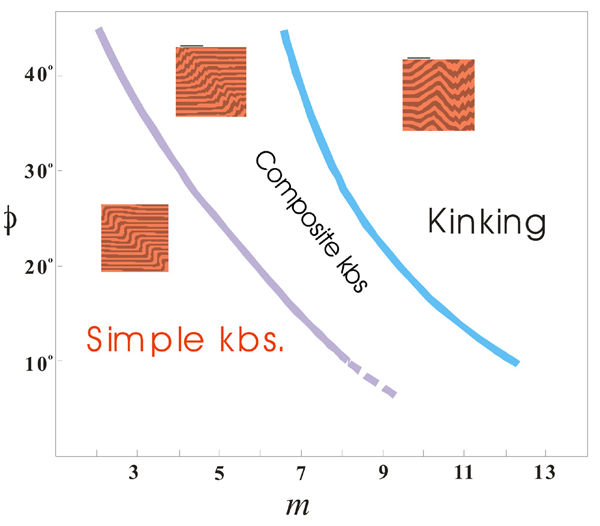A ubiquitous joint body used to simulate well-foliated rocks needs 11 material parameters for complete characterization, of which 7 are for the Mohr-Coulomb (bulk) solid (density, bulk modulus, shear modulus, cohesion, tensile strength, friction angle, and dilation angle) and 4 are for the ubiquitous joint (anisotropy) (cohesion, tensile strength, friction angle and dilation angle). They all affect the deformation of the material. However, density and elastic constants (bulk and shear modules) for rocks are well determined from laboratory experiments and they do not vary significantly for conditions under which kink-bands develop. The range of variation of cohesion in rocks is also limited. The parameters that affect deformation the most are the friction angle of the Mohr-Coulomb solid and the friction angle of the ubiquitous joint. Therefore, to a first order approximation, for kink-band situations, the ubiquitous joint model can be characterized by two parameters: the bulk strength measured by the internal friction angle of the Mohr-Coulomb solid, and the degree of anisotropy. We have carried a lot more numerical experiments with varied friction angles of the Mohr-Coulomb solid and m-values. A transition in deformation mode from strain localization (development of kink-bands), to distributed deformation (kinking), as shown in Figures 6-9, is always observed as f is kept constant and m is increased. We present three more numerical experiments (for m=2, 8, and 10, respectively) for material properties identical to those for Figures 6-9 except that the internal friction is reduced to f = 20° here as animations (Animation 1, Animation 2, and Animation 3), and the transition from one dominant mode of deformation to another as a deformation mechanism map (Figure 14). Since the transition from one dominant mechanism to another is gradual, the boundaries between the mechanism domains are transitional.
Figure 14. Deformation mechanism map

Deformation mechanism map showing the transition of mode of deformation from simple kink-bands through composite kink-bands to symmetric kinks as function of the degree of anisotropy and bulk strength of the Mohr-Coulomb solid. See text for more detail.
Animation 1. Numerical experiment for m = 2
Numerical experiment (for m = 2) for material properties identical to those for Figures 6-9 except with the internal friction reduced to f = 20°.
Animation 2. Numerical experiment for m = 8
Numerical experiment (for m = 8) for material properties identical to those for Figures 6-9 except with the internal friction reduced to f = 20°.
Animation 3. Numerical experiment for m = 10
Numerical experiment (for m = 10) for material properties identical to those for Figures 6-9 except with the internal friction reduced to f = 20°.